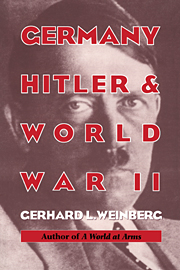Book contents
- Frontmatter
- Contents
- Preface
- Introduction
- Part I Background
- Part II The Nazi system
- Part III Background for war
- 6 Hitler and England, 1933–1945: Pretense and reality
- 7 German foreign policy and Austria
- 8 Germany, Munich, and appeasement
- 9 A proposed compromise over Danzig in 1939?
- 10 The German generals and the outbreak of war, 1938–1939
- 11 Hitler's decision for war
- Part IV World War II
- Appendix: the end of Ranke's history? Reflections on the fate of history in the twentieth century
- Index
9 - A proposed compromise over Danzig in 1939?
Published online by Cambridge University Press: 05 August 2012
- Frontmatter
- Contents
- Preface
- Introduction
- Part I Background
- Part II The Nazi system
- Part III Background for war
- 6 Hitler and England, 1933–1945: Pretense and reality
- 7 German foreign policy and Austria
- 8 Germany, Munich, and appeasement
- 9 A proposed compromise over Danzig in 1939?
- 10 The German generals and the outbreak of war, 1938–1939
- 11 Hitler's decision for war
- Part IV World War II
- Appendix: the end of Ranke's history? Reflections on the fate of history in the twentieth century
- Index
Summary
Although the general outlines of German–Polish relations in the last year before the outbreak of World War II have been known for some time, a number of important details came to light only slowly, and some of these have never been properly integrated into the generally accepted picture of either the final crisis or the personalities who played major roles in it. As additional documents have been published and some of the archives opened, it has become possible to trace the development of German–Polish relations with increasing precision. One of the problems which needs investigation as new material becomes available is the question of whether and under what conditions either country might have been willing to compromise on any of the issues which arose. The positions actually assumed by the two counties and the outcome of the negotiations will be understandable only when the various possibilities considered during the period from October 1938 to August 1939 have been clarified.
The problems raised in the negotiations ranged from the intended issuance of certain Polish stamps considered offensive by the Germans to the German demand that Poland adhere to the Anti-Comintern Pact. The question raised first and the one most in the public eye at the time and frequently also in retrospect is the issue of Danzig, as it was then called, now Gdansk. This city, together with its environs, had been made a Free City under the protection of the League of Nations by the Treaty of Versailles. By the end of 1938, its status as a territory separate from Germany was still intact.
- Type
- Chapter
- Information
- Germany, Hitler, and World War IIEssays in Modern German and World History, pp. 121 - 128Publisher: Cambridge University PressPrint publication year: 1995



